by His Holiness Satsvarupa Gosvami
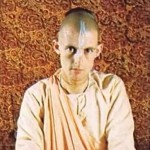 His Holiness Satsvarupa dasa Gosvami is one of the leaders of the Krsna consciousness movement. Until he returned to the United States in July to organize distribution of Krsna conscious books to schools and libraries, he was serving as the personal secretary of His Divine Grace A.C. Bhaktivedanta Swami Prabhupada. Srila Prabhupada, the founder and spiritual master of the International Society for Krishna Consciousness, has been extensively traveling to preach and oversee the progress of his disciples. As Satsvarupa dasa Gosvami traveled with Srila Prabhupada around the world—from New York to London, Paris, Hamburg, Geneva, Bombay, Melbourne and back to Los Angeles (with many other stops in between—he kept a personal diary, filled with accounts of Srila Prabhupada’s activities and words,. These are excerpts from that diary.
His Holiness Satsvarupa dasa Gosvami is one of the leaders of the Krsna consciousness movement. Until he returned to the United States in July to organize distribution of Krsna conscious books to schools and libraries, he was serving as the personal secretary of His Divine Grace A.C. Bhaktivedanta Swami Prabhupada. Srila Prabhupada, the founder and spiritual master of the International Society for Krishna Consciousness, has been extensively traveling to preach and oversee the progress of his disciples. As Satsvarupa dasa Gosvami traveled with Srila Prabhupada around the world—from New York to London, Paris, Hamburg, Geneva, Bombay, Melbourne and back to Los Angeles (with many other stops in between—he kept a personal diary, filled with accounts of Srila Prabhupada’s activities and words,. These are excerpts from that diary.
Hyderabad, India. April 19
At the press conference in Hyderabad one reporter asked right away whether Srila Prabhupada was an advaita (monistic) or dvaita (dualist) philosopher. Srila Prabhupada scoffed at the question. “What is the point of discussing such things—whether one is dvaita or advaita. Krsna says, annad bhavanti bhutani: ‘All living beings subsist on food grains’ Annad means grains. The people have no grains. Grains are produced from rain, and the rain from yajna (sacrifice).’ So perform yajna. Become Krsna conscious. Dvaita or advaita you may be, but you still need grains.”
April 20
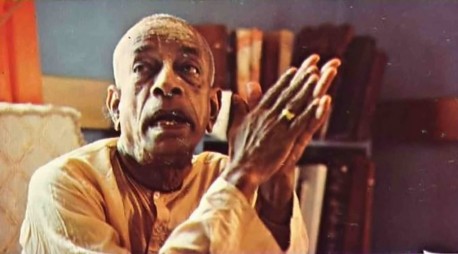
Srila Prabhupada was recalling the press conference. One newspaper reported that he had said that Bhagavad-gita contains all answers to all problems—social, political and otherwise—and should not be misinterpreted. He smiled when he heard that and said, “They have captured the main points of my talk.” As for dvaita/advaita, he said, “Krsna never says we are all one. If a servant says, ‘Yes, I am the same as the master,’ that is his impudence. But the master never says it. Krsna says to Arjuna, ‘Many births you and I have had, but you are not the same as Me. You forget; I do not. Therefore you should surrender to Me.’ Where is the question of advaita if Krsna says ‘Surrender to Me’? Our philosophy is both advaita and dvaita. We are one with Krsna in our qualities, but He is much greater than us.”
April 21
After his lecture at the exhibition grounds, a crowd of about 1,000 presses forward, and with great difficulty, forming a human chain, we escort Srila Prabhupada back to his car. Many spectators dive forward to touch his feet. On the way back, Srila Prabhupada was appreciating that the big crowd was silent during his whole lecture. “The women and children,” he said, “could not even understand English. This is a good field for Krsna consciousness.” Later I commented that his lectures seemed planned out, although I see that he simply chooses a verse and speaks without preparation. “It appears that I prepare?” he asked. “Yes,” I said, “there is such symmetry to each lecture.” “Krsna is speaking,” he said, “I am not speaking. I am His microphone. Let us depend on Krsna, and He will do everything.”
April 22
On his early-morning walk, with three sannyasis [disciples in the renounced order] present, Srila Prabhupada took the role of a pious religionist and challenged us, saying we had nothing to teach him, since he already loved God. “But you don’t know what God is,” one of us said. “That’s all right,” he said. “Whatever idea I have, I am praying. If I didn’t love God, I wouldn’t go to church.” We gave argument after argument, but he rejected them all, saying he was as good in his religion as we were in ours; he had his own love of God and scripture and world religion, and he was as good as we were. We couldn’t catch him. Finally he revealed to us what we should have said: “If you love God, why do you disobey Him?”
* * *
A sympathetic Endowments Officer from the government was talking with Srila Prabhupada. He said that the government policy is that everyone should be God conscious, and it seems they have a branch that dispenses money to different temples for the propagation of Hindu culture. He said that “orthodox brahmanas” [religious intellectuals] object to ISKCON because we recruit men from the mleccha and yavana classes [meat-eaters, outcastes] and make them brahmanas. Srila Prabhupada opened his Sanskrit Bhagavatam and turned to a passage where Narada is talking to King Yudhisthira about the four orders of society [intellectuals, administrators, merchants and laborers]. Narada said that if you find in another country a person working as a brahmana, with the qualities of a brahmana, he must be accepted as a brahmana. Srila Prabhupada then read Sridhara Svami’s comment on the verse also. If one gets a degree as an engineer but sits home and doesn’t work, he’s not an engineer. Krsna created the four social orders on the basis of guna and karma, one’s qualities and his work. It’s very scientific. One must acquire the qualities, and he must work. And the role of a secular government is to see that brahmanas are actually working as brahmanas. So the four castes must be maintained. This is called varnasrama. Prabhupada said that if the Indian government would finance him, he could rid India of godlessness in a year. “People are fed up with materialism and cheating yoga. Why not support this movement? Immediately we could open one hundred Varnasrama Colleges and start training. We wouldn’t just rubber stamp a man ‘brahmana’ because he happens to be born in a brahmana family. That religion of the body won’t do. One must actually become qualified.”
That is just one sample of the practical discussions about Krsna and practical proposals that Srila Prabhupada talks about with respectable men hour after hour, day after day, untiringly, with 100% conviction and fresh enthusiasm.
Srila Prabhupada said that someone wanted to write a book about him, just like the big books people write about their gurus to call the gurus God. But he said, “No, write books about Krsna—hundreds of volumes about Krsna.”
April 25
We flew to Tirupati. In the mountains nearby is Tirmula, where there is the richest temple in India, the Venkatesvara temple, with its Balaji Deity. Srila Prabhupada very much liked the cottage the temple managers provided for him. They were very respectful and let our party enter the temple, although (l) people usually have to wait on a long line, since 15,000 people enter daily, and (2) Westerners are usually not allowed in. Following behind Srila Prabhupada, however, we walked right in. In the cottage there was a picture of the Balaji Deity. Prabhupada said that the Deity’s name means “child,” Krsna as a cowherd boy, not in His Vaikuntha aspect [His majestic form in the spiritual planets]. “What do the rascal scientists know of Vaikuntha?” I said. “They haven’t seen these planets through their telescopes.”
He said, “That [telescope knowledge] is imaginary, defective. So many planets are glittering at night. What do the scientists know of these other planets? They cannot say that such a place [the spiritual sky] is not possible. The rascals can’t get a vague idea of even this one planet.” I said they are making progress because 500 years ago people thought the earth was flat. “Not in the Vedas,” he said. “It is clearly stated: goloka, meaning ’round.’ Maybe in your Bible,” he laughed, “but although you didn’t know, the Vedas knew.”
About all the people going to see Balaji, Srila Prabhupada said, “This shows that the mass of people are still attracted to God, despite government propaganda. The people are coming and going, visiting the Deity. But an advanced devotee can capture God in his heart. Premanjana-cchurita-bhakti-vilocanena: with the ointment of love of God spread over his eyes. Of course, Deity worship is good for the neophyte.”
We went three or four times daily to receive darsana [association] of the Balaji Deity. One time we went at 2 in the morning. The Deity is very big, in a dark inner sanctum where the only light comes from the torches held by the pujaris [attendants]. Srila Prabhupada would regularly leave his cane on the rail before Balaji, and then, after we were walking out, he would call “Where is my stick?” and we would have to go back for it. As the general mass of people go into the temple for alleviation of material distress, they call out “Govinda!” When Srila Prabhupada started in (you have to go barefoot in the whole area around the temple, outside also) he would say “Govindam adi-purusam tarn aham bhajami” [I worship Govinda, the primeval Lord]. He said we should build temples like this Venkatesvara temple, which has a gold dome and wonderful facilities for visiting pilgrims. While he was there, Srila Prabhupada took Balaji’s prasada [food offered to the Lord] and said it was tasteful. He said that Lord Caitanya had visited this and many other places all over south India. We were thinking that Srila Prabhupada, who says he hasn’t visited any holy places in India except Mayapur and Vrndavana, was visiting them to purify them.
May 25
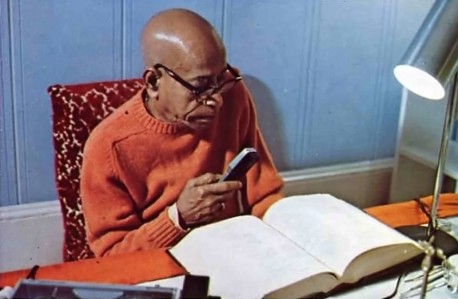
People ask, What is Srila Prabhupada’s day like? Srila Prabhupada rises about 1:30 a.m. Sometimes around 2 or 3 a.m. I awaken and hear him dictating. Once one man in Bombay said to Srila Prabhupada, “Today I rose at 2:30!”—to which Srila Prabhupada replied, “I rose at 1:30!” In Hyderabad Gargamuni Svami said to me, “What other sadhu in India gets up at 1:30 to write books?” It is great proof of his authenticity. In Bombay we set up a small house of mosquito netting for him to work in. He opens the big volume of Bengali Caitanya-caritamrta, and with a small desk lamp lit, he begins translating the synonyms one by one, clicking the dictaphone button as he pauses briefly for his thoughts.
The translation work usually goes on for two or three hours, sometimes less. From around 3 to 5 he sits and chants Hare Krsna on his beads. Srila Prabhupada chants beads almost silently, although the motion of the beads can sometimes be heard in the next room, and sometimes “Hare Krsna, Hare Krsna.”
His regular morning walk begins just before the sun comes up. In India, Srila Prabhupada says, clothing is artificial; India is so warm. In other countries sometimes he has to bundle up in big coats and a hat. He wears a pair of shoes that he saves only for the morning walks. As Krsna is known to appear in yellowish garments with a peacock feather in His hair, our spiritual master wears saffron, with a wrapper around his shoulders or over his head, and walks with his cane, followed by his devotees. In the Krsna book it says that a devotee is like a waterfall—sometimes he speaks, and sometimes he is silent. I asked what this means, and Srila Prabhupada said that the devotee speaks at his will; he is not obliged to speak. Devotees are eager to accompany Srila Prabhupada on his walks. Sometimes he speaks the whole time. He walks long, usually about an hour and a half. If it rains he says, “Today we will take our walk sitting down,” and we ride in the car.
Geneva, Switzerland. May 30
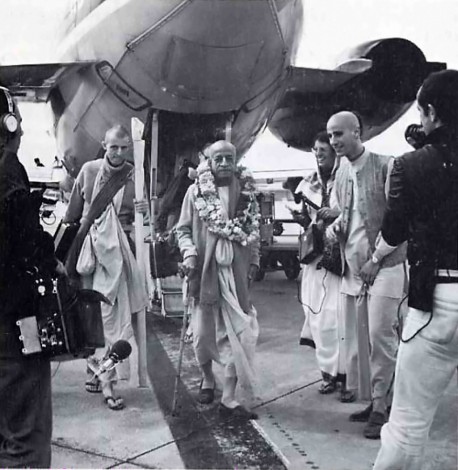
Flying here, Srila Prabhupada said, “This is a very dangerous spot [amidst the Alps]. Many planes crash here.” Later I asked if great sages still lived in the Himalayas. He said yes: Vyasadeva, Valmiki and Nara-Narayana. I mentioned to him that in the Bhagavatam he says that there’s a gold peak in the Himalayas. “Yes,” he said, “if they find that out, they will become mad to go there.” This afternoon we were given an official reception by the governor of Geneva. Srila Prabhupada spoke on the verse sa vai pumsam. . . “The science of God must begin with knowledge that one is spirit soul, not the body.” The governor asked, “If everyone becomes Krsna conscious, won’t the economy be in trouble?” “No,” Srila Prabhupada said, and he quoted the same verse he cited over a month ago in Hyderabad: annad bhavanti bhutani. “Everyone subsists on grains.” So he proposed that if everyone cultivates his own land and keeps cows, there will be no economic problem. One should live simply and spend the saved time solving the problems of birth, death, old age and disease. Later Srila Prabhupada asked, “Were my answers all right?” I said that the governor asked about the economy being in trouble if everyone became a devotee because he thinks we are simply beggars. “Therefore,” Prabhupada said, “I talked about tilling the land. We are not beggars. We are giving the highest knowledge. We gave him the book of highest knowledge [Bhagavad-gita], but he could not give us anything.”
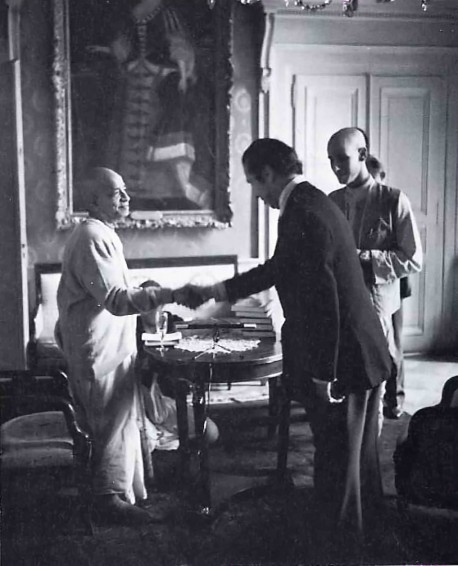
June 5
This morning on his walk, and again tonight with the Dean of Theology at Geneva, Srila Prabhupada gave this example: What is the important thing in the body? It is the spirit soul, the life force. That is what’s making the body move. Just as in an airplane the important thing is the pilot. The living entity within the body, the life force, is making the hand move, the eye see, the mind think. . . So in the universe, there is a life, a Soul, which is moving everything. As the person within the body is the important thing, so the Supreme Person is the important element in the universe that is making everything move and sustaining everything. We are isvaras, or controllers, of our bodies, but He is the supreme controller, even of us. Each of us is controlled by God, the supreme controller, so to disobey His orders is sinful life. To agree to obey His direction is religion. Tonight after explaining this, he said, “I think this is perfect knowledge.”
He talked often with the Christians about why they disobey God by killing other living entities. Finally one of them complained that we were just talking the whole time about meat-eating. “Why can’t we talk of higher principles?” they asked. Srila Prabhupada said, “So long as one is sinful, there is no question of understanding higher principles.”
Paris, France. June 9
He said that Paris attracts so many tourists. His hosts drove him around to see the Louvre buildings, the Arc de Triomphe, and other sites. He said that in India (for example at Tirupati, where Balaji temple is) the same tourist urge is there, common people are visiting daily by the thousands, and the statues are there, but in India it is for God. While driving they pointed out where embassies are, and one devotee quipped, “So we have opened a Krsna embassy.” “Why one embassy?” he said. “Every house should be an embassy. Everywhere, a Krsna embassy.”
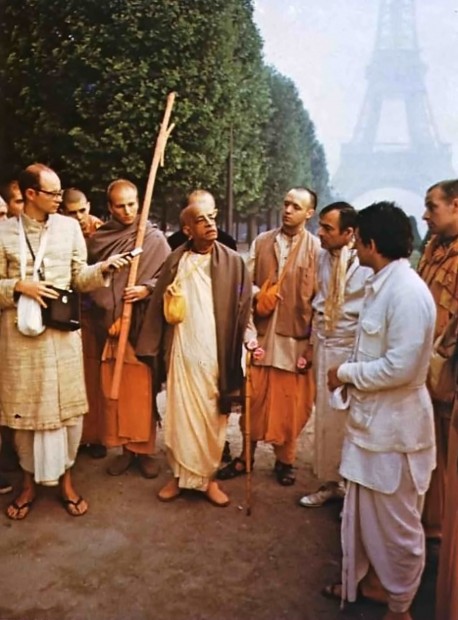
“In the beginning was the Word, and the Word was with God.” This means that the word preceded the creation. Therefore it was transcendental. We have to inquire, “What is a transcendental Word?” The poet Narottama dasa Thakura says, golokera prema-dhana hari-nama-sankirtana: “Hare Krsna comes from Krsnaloka.” This means it is a transcendental, not a material, sound or word. The creation comes from the word of God. For example, His Divine Grace Srila Prabhupada has started what is now a very large spiritual movement. In the beginning of the movement there were no buildings and students; he came to this country without money, only with the word. But by preaching the transcendental word, all of ISKCON has become manifested. That’s an example of the creative power of the word. The transcendental word of God, existing before the creation, is eternal, above the material creation—and it is the cause of the whole creation. Therefore by transcendental sound we are chanting Hare Krsna and becoming God conscious.
Germany. June 18
Hamsaduta arranged a procession of 20 vehicles from the airport to the castle where the devotees are staying. Srila Prabhupada was pleased: “My heart becomes engladdened when I hear a mrdanga in a German village.” [A mrdanga is a drum for chanting Hare Krsna.] He quoted Lord Caitanya’s verse that in every village the chanting will be heard. He said, “We should be aware that our goal is a worldwide movement. Actually, we have communities all over the world, but the movement is still very, very small. It will expand, however, and the whole world can be united under Krsna for peace.” But then, he said, people’s only objection to us is that we are trying to prevent them from going to hell; therefore they misunderstand us. It’s like when a man flies a kite on a roof and you see that he’s in great danger, about to walk off the roof. But when you tell him, “Look out! You’re in danger!” he becomes angry. “What! You have checked my movement.” Any gentleman will speak out if he sees another plunging into danger. But they object. One world under Krsna—we are not after domination, but we want to free people from death, old age and disease.
Srila Prabhupada has been pointing out that the wars which are starting every few years in the West can be traced to karma from cow killing. It has very disastrous effects, the slaughterhouse. He says, “People should live in peace, eating the food they raise themselves from the land, and chanting Hare Krsna. Why artificially start these wars? They do not recognize that everything belongs to God. You can have the land to work; He has given you enough of everything to live peacefully. It is the fault of the so-called leaders. The mass of people are good.”
June 19
He said that the idea of transmigration of the soul is very important—the beginning of transcendental philosophy—but no one in the West understands it. I brought up the argument that although the materialist will accept that we are changing bodies in this lifetime, and also that he is experiencing the change of bodies in dreams, these things are still within one lifetime, so he does not experience changing bodies at the time of death. Srila Prabhupada said, “But in the dream one doesn’t remember everything; so much of it is a hodge-podge mixture of different things. Our nature is to forget. Also, do you remember every-hing of your childhood? We have forgotten so many things. We do not remember being in the womb of the mother and suffering under those conditions, but we were there. The fact that we do not remember something does not mean it did not exist. So, we are forgetful and do not remember our past lives. The most important thing is the authority of Krsna; He is the perfect authority, and He logically presents transmigration in Bhagavad-gita.” I said, “If we simply say you must believe it because Krsna says so, they will take it as dogmatic.” “No,” he said, “the reasoning is given there, but the authority is final. For example, if you want to know who your father is, you can investigate in different ways your genealogy, your natural attraction to both parents, or your similarity to them in character—but finally the mother is the authority without flaw.”
Melbourne, Australia. June 21
I mentioned to Srila Prabhupada that now that India has the nuclear bomb, other small nations are rushing to get it. He said, “What is this nuclear bomb? I will drop it on you and in turn you will drop it on me. What is the advancement over the dogs? This tearfulness of one nation for another with nuclear bombs is the dogs’ mentality. Sometimes, even when chained by their respective masters, two dogs will fight as soon as they meet. Have you seen it? It’s no better than that. “But,” I pursued a vague anxiety, “devotees sometimes think we are planning for the long-term future when we distribute books to schools and libraries, but if everything is going to end in nuclear war. . .” “Assure them,” said Srila Prabhupada, “that there will be no nuclear war if they take to Krsna consciousness. And even if there is nuclear war, that is not going to end everything. Formerly there was the brahmastra [a weapon of Vedic times similar to today’s nuclear bomb]. Everything is under the control of the Supreme Lord. We are not afraid of the nuclear bomb, because the soul cannot be killed by the atom bomb. Do you know that? Have you read it? So what do they want to do in fear of the nuclear bomb—to sit down and do nothing and cry?” I said, “Well, we are asking people to invest in 60 volumes of Srimad-Bhagavatam, but they might say, ‘I don’t want to make such a long-term investment in the future because there is nuclear war ahead.’ ” “Then why are they going to the university? Why don’t they stop eating? Do they mean one should not go for an education and should not have any hope and should stop everything?” “Yes,” I said, “some think like that—that it is doom.” Srila Prabhupada expressed concern that people have been put into such a consciousness. Then he repeated that I should assure people that there will not be such a war if they can become Krsna conscious. “In fact, because of our Krsna consciousness movement, there will be no nuclear war. But even if there is, the soul cannot be killed, so we are not afraid the bomb will kill the soul.”
In Melbourne, Srila Prabhupada has been getting lots of news coverage. One article misrepresented him, saying, “His Divine Grace is resigned to dying soon and returning to earth as an animal.” Amogha prepared a letter to the editor asking him to print what Srila Prabhupada actually said. Amogha wrote that a pure devotee’s condition is just the opposite: he goes to the kingdom of God after leaving this body. The next morning in class, Srila Prabhupada commented on the news article. He explained how the reporter, being against us, was really saying, “Let the svami come back as a dog.” (Actually all the miscreants will come back in the lower forms of life, not the devotees.) Prabhupada had actually said, “The devotee doesn’t mind how he comes back, so long as he is with Krsna. To become Krsna’s animal is a great thing. In Krsnaloka the cows embraced by Krsna, and the other animals—or even the plants—are very exalted to be with Krsna.” So there is no objection if he becomes Krsna’s animal in his next life.
June 29, 1974
On his morning walks through the Royal Botanical Gardens in Melbourne, Prabhupada would ask how many varieties of plants they have. On several occasions he asked, “Do they have two million varieties? Krsna has produced two million varieties of plants, but I think maybe they have two thousand.” He said, “The plants are standing still while we are able to walk because they are being punished. But although it is punishment, Krsna’s intelligence is so nice that it has become a beautiful arrangement.” Madhudvisa Maharaja asked, “If one gets a body according to his desire, so that one who wants to eat flesh can become a tiger—well, who would want to become a tree?” (We understand that tree life is the result of too much lust.) Srila Prabhupada said, “The students in America like to stand naked. So Krsna says, ‘Here, take the body of a tree. Stand naked for a hundred years.’ ” I could suddenly understand better Prabhupada’s position as our savior. He can save us from coming back in the lower species. If we follow the regulations of devotional life he has taught us, if we don’t fall down from this, we can go to Krsna at the end of this life. Those bewildered by material desires have to go on in the material world.
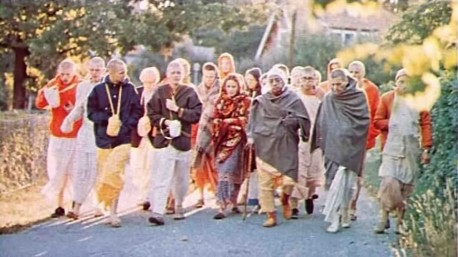
Prabhupada is very interested in the excellent response from high church officials here in Melbourne. He wants to make a united effort with the Christians. The preaching platform is that they should chant the name of Christ, which is the same philologically as Krsna, coming from the Greek “Christos,” and stop the animal slaughter. The clergy is appreciating this approach.

[…] excerpt from the article Secretary to a Pure Devotee, Back to Godhead #68, […]